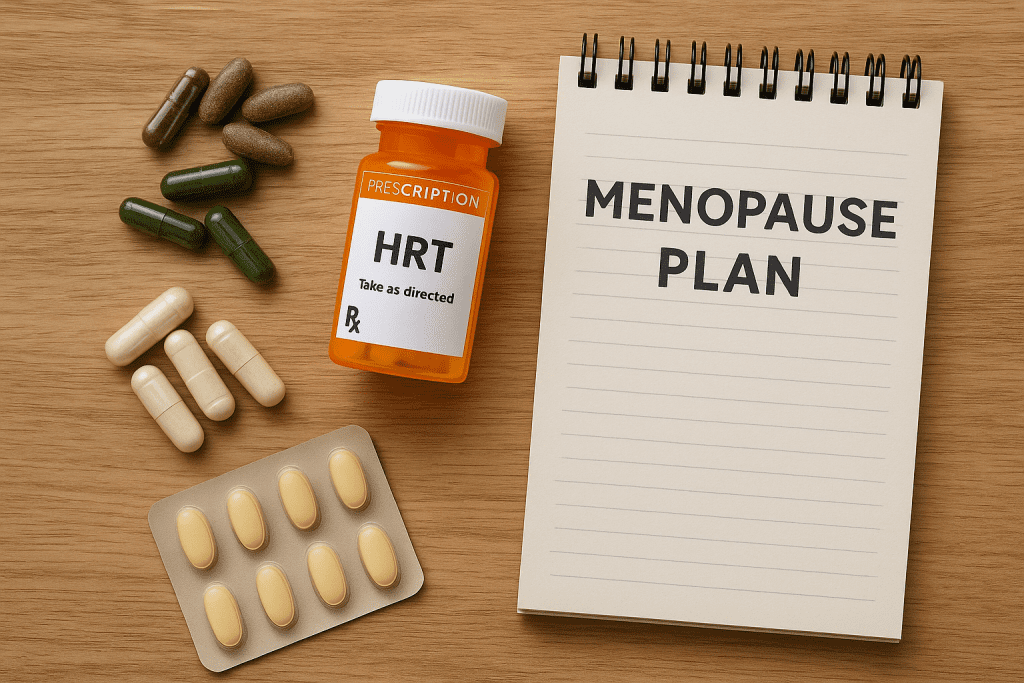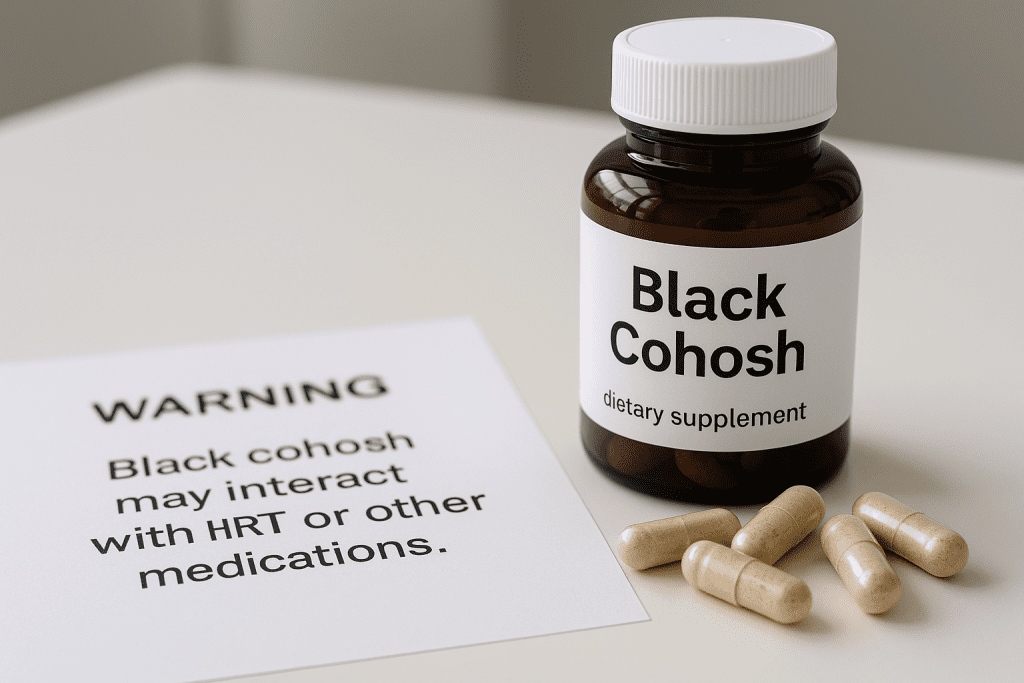Can supplements like black cohosh interfere with hormone replacement therapy (HRT)? That’s a question many women ask when trying to ease menopause symptoms naturally while following medical treatments.
This article explores the evidence behind menopause supplement HRT interaction, focusing on herbal products such as black cohosh and red clover, and how they may affect estrogen therapy.
You’ll also get current medical guidance on safely combining or choosing between these options.
Summary / Quick Answer
Some menopause supplements can interact with HRT by altering estrogen activity or liver metabolism. Here’s what to know:
- Red clover may increase estrogen effects and disrupt drug metabolism
- Black cohosh shows mixed results – possible liver concerns and conflicting hormone activity
- Dong quai has weak estrogenic potential and may affect hormone-sensitive conditions
- Clinical advice recommends caution, especially when using multiple therapies
- Always discuss supplement use with your healthcare provider
How Common Supplements Interact with Hormone Therapy
Many herbal menopause remedies mimic or influence estrogen pathways. When layered with HRT, this can lead to unintended effects, either amplifying or undermining treatment goals.

Red Clover: Estrogen Boost or Metabolic Risk?
Red clover contains phytoestrogens, compounds structurally similar to estrogen, which may amplify the effects of HRT. While this might sound beneficial, excessive estrogen activity can lead to increased risks tied to hormone-sensitive conditions.
More critically, studies have shown that red clover can inhibit key liver enzymes (cytochrome P450s) responsible for drug metabolism. For women on tamoxifen or raloxifene, this raises red flags. When combined, red clover altered drug-processing pathways, suggesting a risk for interactions that could compromise treatment safety and efficacy (PubMed).
Key Takeaway: Red clover may increase estrogen activity and disrupt how medications are processed.
| Supplement | Interaction Concern | Clinical Implication |
|---|---|---|
| Red Clover | Boosts estrogen effect; alters liver enzymes | May interfere with tamoxifen, increase estrogenic side effects |
| Tamoxifen/Raloxifene | Compounded effect when combined | Caution advised under supervision |
Black Cohosh: Safe Option or Hormonal Wildcard?
Black cohosh is often marketed as a hormone-free alternative, but its actual behavior in the body is more complex. While some studies report no known drug interactions and minimal side effects when taken with estrogen, others suggest caution, especially concerning liver health.
According to Mount Sinai, black cohosh may not be ideal when used alongside medications processed by the liver. Reports also link it to interference with cancer therapies like chemotherapy or radiation. Meanwhile, research from Yale hints at anti-estrogenic activity, which could counteract the effects of estrogen therapy.
So, which is it—hormone helper or disruptor? That depends on individual factors like dosage, liver function, and concurrent treatments.
Related Tip: Our app comparing supplement brands for purity helps identify reliable sources when evaluating black cohosh products.
Dong Quai, Soy, and Other Herbal Options
Dong quai is another traditional remedy used to relieve hot flashes and mood swings. But it may act like estrogen in the body, raising concerns for women with hormone-sensitive conditions like breast cancer.
Clinical data on dong quai’s interaction with HRT is limited, but the NHS notes that most herbal supplements aren’t tested to the same standard as prescription treatments. That uncertainty makes it hard to predict how supplements and hormones will interact.
Other natural supplements, such as soy isoflavones, evening primrose oil, and ginseng, also show mild estrogenic properties but remain understudied in combination with HRT.
Important Note: Use caution when combining any supplement with hormone therapy unless under clinical supervision.
What Gynecologists Recommend for Symptom Relief
Doctors increasingly support tailoring menopause care to the individual. Still, HRT remains the most effective treatment for vasomotor symptoms (like hot flashes) and vaginal dryness.
According to the North American Menopause Society, systemic estrogen therapy alone or with progestin is still the first-line treatment for many. A survey of gynecologists found that 92% recommend HRT as a routine option.
That said, 57.5% also support phytoestrogens, especially for women unwilling or unable to take hormones. Supplements like black cohosh are often offered as alternatives, though they are generally less effective. For instance, one trial found that HRT outperformed soy isoflavones in reducing hot flashes.
Many gynecologists also recommend calcium and vitamin D supplements to support bone health during menopause, regardless of HRT use.
Is It Safe to Combine Supplements with HRT?

Clinical Tips for Safe Use
If you’re considering combining menopause supplements with hormone therapy, talk to your healthcare provider first. Here’s why:
- Liver health matters: Black cohosh and similar herbs may pose a risk to liver function, especially when combined with medications processed in the liver.
- Red clover affects drug metabolism: It may increase estrogen levels and reduce the efficacy of drugs like tamoxifen.
- Estrogen effects can vary: Some supplements may mimic, block, or alter how estrogen works in your body.
- Start low, go slow: Follow the general HRT guidance of using the lowest effective dose for the shortest period necessary (ACOG).
When to Avoid Supplement + HRT Combinations
You should avoid combining supplements and hormone therapy if you:
- Are being treated for breast cancer (e.g., with tamoxifen)
- Have a liver disorder or compromised liver function
- Experience unusual symptoms like jaundice, fatigue, or gastrointestinal distress after starting a supplement
Tip: Use a symptom logger for drug-nutrient side effects to track any new reactions when adding supplements to your routine.
Conclusion
Combining herbal menopause supplements with HRT can be safe in some cases—but not without risk. Red clover may increase estrogen levels and alter how medications are processed. Black cohosh has a mixed safety profile, especially in women with liver issues or hormone-sensitive conditions. Dong quai and similar herbs may carry estrogen-like effects, though evidence is limited.
Most gynecologists continue to recommend HRT as the most effective symptom management option. However, supplements still play a role for those seeking alternatives or added support. The best approach? Partner with your provider to build a personalized, evidence-based menopause plan.
Looking for more? Explore joint pain from calcium supplements and steroids or check out our trusted app comparing supplement brands for safer selections.

